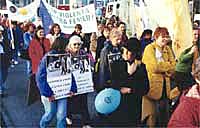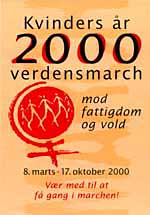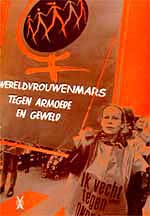April 2002 - Snapshots of Home and Elsewhere - Europe
 |
|
On track for a feminist,
|
The fight against violence, a priority everywhere on the planet. Pictured: March 8, 2000 in Geneva, Switzerland. |
 |
Inequality in industrialized countries
In a Europe of diverse cultures and economies, women of the March denounced the impact of a deteriorating economy that has led to wide-scale migration from Eastern to Western Europe, paving the way for drug trafficking and sex trafficking of women and girls.
| See also : « For East Europe's Women, a rude awakening », Elisabeth Kulakowska, The Unesco Courrier. |
They criticized the insecurity in which numerous women live, including in the industrialized countries, where they are often second-class citizens.
Indeed, women are unemployed more often and for longer periods than men. More women than men hold unstable and poorly paid jobs. They are less well paid than their male colleagues, even when they are in the same jobs. And the majority continues to work a double shift. European women called for professional and salary conditions equal to those of men, social protections to enable them to live in dignity, and the abolition of all forms of discrimination in this area.
European policies must be harmonized "upward" in the social realm and in the campaign to end violence against women, in Europe and in the world. Other demands included victim assistance, simplified legal procedures, prohibition of sexual harassment, and the criminalization of wife assault.
Although many countries still prohibit free access to abortion (Ireland, Portugal, restrictions in Poland, debate on time limits in Switzerland), European women have reaffirmed their opposition to religious fundamentalism manifested in particular by extreme right-wing Catholic organizations.
In a society dominated by the model of "obligatory heterosexuality," Europeans demanded that lesbian rights be included in the demand for the right of every woman to control her own body.
|
Participating countries and territories: Albania Armenia Austria Azerbaijan Belgium Bosnia-Herzegovina Bulgaria Croatia Cyprus Czech Republic Denmark Estonia Federal Republic of Yugoslavia (Serbia-Montenegro) Finland France Georgia Germany Greece Hungary Iceland Ireland Italy Lithuania Luxembourg Macedonia Netherlands Norway Poland Portugal Republic of Moldova Romania Russia Spain (Andalousia, Austurias, Bask Country, Catalonia, Galicia, Madrid, Valencia) Sweden Switzerland Turkey Ukraine United Kingdom. |

Illustration : A handout released in Denmark.

Illustration : Evaluation of the March in the Netherlands.
|
|
Copyrights
:
CC by-nc-sa 2.0
Last modified 2006-03-23 03:09 PM This item is available in Français, English, Español |


